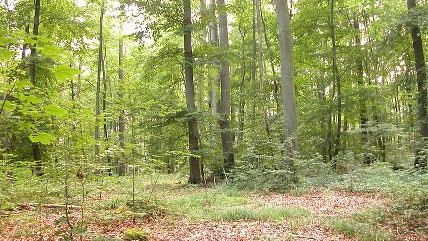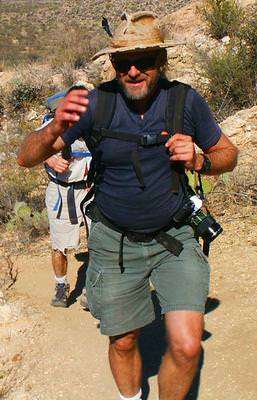Leave Room For the Mountain Men
There needs to be room for people who would seek, without hurting others, to exit a life that doesn't appeal to them.


2013 marked the tenth anniversary of the death of Bryan Clements. My friend's obituary in the Arizona Daily Sun attributed his passing to "complications following brain surgery," though the reality of his end was rather weirder and more interesting than that suggests. So was his life. Bryan was a part-time mountain man, and a model for some of the attributes of Rollo, a main character in my novel, High Desert Barbecue. He mattered not just because he made the world a stranger and better place, but also because the room for his existence is an underappreciated feature of what can be an all-too stifling and rule-bound society.
Bryan lived in Southeast Asia for a while, which was everybody's best guess as to where he picked up the fungal brain infection that did him in. But by the time I knew him, he was living much of his time in the forests and deserts of northern Arizona. He'd work for a while—database programming was one of his money-makers—and when he'd topped off his bank acccount and had his fill of civilization, he'd disappear into the wilderness.
Bryan's lifestyle meant that he could drop off the radar and reappear rather unpredictably. I answered a knock on the door one day to find him standing on the doorstep, literally hat in hand. With him was a companion apparently excavated from the dry gulch that time forgot, and who spoke only authentic frontier gibberish. Bryan translated while I broke out a few beers. A wildfire had cut them off from their camp at the head of Sycamore Canyon. Did I have any gear to spare?
I did. One of my tents and some other equipment kept them going for several months.
Sycamore Canyon, the location of that cut-off camp, featured in an event that inspired a scene in my novel. A group of us backpacked up the canyon, past Parson's Spring, and made camp amidst the rocks on the canyon floor. The next morning, we awoke to clear blue sky, and bitter cold. One of the challenges of canyon hiking is that the sun takes its time in making its presence known. The day may come, but you shiver in the shadows until the sun is overhead.
My girlfriend (now wife) and the rest of our group set to making a fire, but Bryan and I decided, if the sun wouldn't come to us, we'd go to it.
So we climbed the canyon wall. The climb was … hairy, but do-able—especially since all we wanted was to reach that splash of warmth we could actually see. We pulled ourselves over ledges, scrambled up oversized stairs, jammed our feet into toeholds, and belly-crawled over fossil deposits. Finally, we reached the top and luxuriated in sunlight. We found cairns there that I think marked a continuation of Packard Trail, which is probably more popular with cattle than hikers.
That climb later inspired Rollo's and Scott's wall-scaling and elevated gun battle in High Desert Barbecue.
Bryan was something of a gut-level anarchist. I knew he'd voted Green and Libertarian at different times, to the extent that he voted at all. And if the occasion called for it—meaning, if he was in the mood for an argument—he was capable of taking an Ed Abbey-esque stance favoring the end of civilization. But then, if anybody was fool enough to take his side on that position (and Flagstaff isn't short of such fools), he was perfectly capable of dropping it like a hot rock and arguing its absurdity. After all, somebody had to brew his beer, and desert canyons crowded with parched and starving grad students were going to be both grim and rather short of cold suds.
Basically, Bryan liked to be left alone.
He may have often been on his own, but he wasn't alone in his preference for life beyond civilized boundaries. The Arizona Daily Sun wages endless editorial-page war against the "transient camps" that appear around Flagstaff during the pleasant weather. And it's true that the "transients" that encroach on a town can go beyond annoying and be outright dangerous, with poor fire-tending by boozed-up inhabitants a constant threat.
The Daily Sun editorial board would have you think that characterization is true of everybody who prefers sleeping under stars over sleeping under a roof. But, as with every population, there's a range of responsibility and manners to be found among "transients" as among those with a formal address. In fact, even some of the transients living near town conduct themselves well enough to go undetected for years on end. Thomas Crawford lived in a cave within walking distance of Flagstaff for 11 years before he was discovered by chance.
Those who live further out tend to bother nobody, and live entirely off the radar—so long as they resist the temptation to offend against others and make themselves targets. Usually, you hear about them only when they meet their end—often amidst comments about how they couldn't live indoors or abide by the rules.
Bryan, and some of the people I met through him, were living proof that, headlines and uptight editorial writers aside, a good many of those who find the rules too constricting and the walls too claustrophobic are willing to live and let live. Trying to force those who don't hurt others into treatment programs or shelters against their will, as some of the smugger commentators would do, is a recipe for violence. Hell, it is violence that just begs for resistance. It also speaks poorly of our willingness to tolerate those who take a look at the world we've built and say, "no thanks."
Maybe not just intolerance, but insecurity. I suspect those who chase after wilderness dwellers have a lot in common with the sponsors of the Ex-PATRIOT Act and similar measures to punish people who would turn their back on the United States to live and work elsewhere. You can sense their rage that anybody would want something different than establishment-approved life under the watchful eyes of jealous would-be masters.
I like roofs a little better than Bryan did, though my tolerance for rules is about the same. I may never follow his footsteps into wilderness habitation, though I've considered it from time to time. But whatever our own preferences, there needs to be room for people who would seek, without hurting others, to exit a life that doesn't appeal to them and make another for themselves.


Show Comments (140)